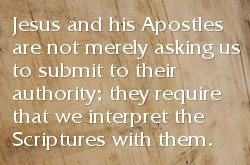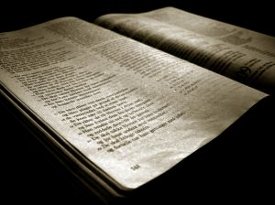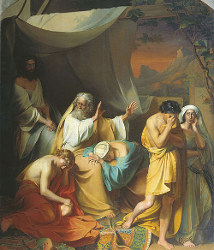Book Review - Greek for the Rest of Us
Have you ever wanted to learn Greek? A good number of Bible students and faithful church attenders have given a yes to this question. But these same people are often perplexed as to how they can actually learn Greek, Some may find themselves overwhelmed in a intorductory Greek class and conclude that it will have to always be “just Greek to me.”
Discussion
My Three Sons
The deluge had passed, and the ark had been parked. It was now time for Noah and his family to enter into the postdiluvian “brave new world” that awaited them. Noah’s first act after debarkation was to build an altar and offer sacrifices to the Lord. This act elicited God’s promise that He would not smite every living thing again as He had done (Gen. 8:20-22).
The Lord then established a “covenant” with Noah and his descendants (9:9). Since we all are his descendants, the regulations of this covenant apply to all of mankind. The Jewish tradition states that the Noahic Covenant illustrates what God expects of all people, not just the Jews. The provisions of the Noahic Covenant regarding the spread of life, the source of life and the sanctity of life are given in Genesis 9:1-7. God pledged His faithfulness to these promises by the token of a “bow in the cloud” (Gen. 9:12-17). As a warrior or hunter hangs up his bow after using it, the LORD placed His bow in the sky after He shot it at the earth with the flood. By this sign, He promised that He would not perform that same act again!
Noah’s three sons—Shem, Ham and Japheth—became the progenitors of new life on an earth that had been wrecked by the flood but also purified from its ungodly inhabitants (Gen. 6:7). As the sons are mentioned in the text, Genesis 9:18 records a tiny piece of information that is important in understanding the rest of the account: “Ham was the father of Canaan.”
The following verses (9:20-27) record a sad event in the life of Noah, the man of whom it had been said, “Noah was a righteous man, blameless in his generation. Noah walked with God” (Gen 6:9). These verses describe the fall of a good man. “Noah began to be a man of the soil, and he planted a vineyard. He drank of the wine and became drunk and lay uncovered in his tent” (Gen. 9:20-21). Scripture records both the victories and the defeats of God’s people. That fact is an often overlooked evidence of the Bible’s truthfulness, since authors tend to play down the faults of their “heroes.”
Discussion
Book Review - Walking with God through Pain and Suffering
[amazon 0525952454 thumbnail]
Timothy Keller wades into the depths of the human experience with Walking with God through Pain and Suffering. It’s a book that “take[s] life seriously … [and] want[s] to help readers live life well and even joyfully against the background of these terrible realities [of pain and suffering]” (p. 3). He does this by pointing out that Jesus Himself experienced suffering and pain. He shows how other worldviews attempt to address the concepts of pain and suffering but are bankrupt.
Discussion
Progressive Revelation, Part 6
 Read the series so far.
Read the series so far.
In this last post in the series I intend to do three things. First, I will be drawing the conclusion that there are two very different ideas, and hence definitions, of “progressive revelation” (PR), and both operative words (“progressive” and “revelation”) mean something very different both separately and together, depending on who is using them. Thus, there is no really agreed upon definition of this term within Evangelicalism (or, indeed, biblical studies generally). Second, I want to quickly address the straw man issue (I’ll call it Objection 2). This is in case someone says that I have misrepresented the position of covenant theologians. I have not, and I shall furnish a couple more examples to prove it. Finally, in line with my call for plain speech and good communication, I want to close by asking which position on progressive revelation really is what one would be led to think it is.
Two conflicting ideas, and the importance of recognizing fuzzy definitions
The definition of progressive revelation which I have been commending in this article is as follows.
Progressive Revelation is the view that supplemental disclosures about a particular subject are built upon and traceable back to an original grounding revelation. The combined witness to the subject must evidence enough commonality so as to present a comprehensible picture of the subject which can be cross-checked and verified against every instance of the progression.
Discussion
Do You Agree with Jesus?

Two of Jesus’ disciples were walking along the road to Emmaus on the first resurrection Sunday, and they were distraught: “Jesus of Nazareth who was a prophet mighty in deed and word before God” was dead (ESV, Luke 24:19). They “had hoped that he was the one to redeem Israel” (v. 21), but now he was dead. Their grief touches us even across the years.
A stranger appears and walks besides them and berates them by saying, “O foolish ones, and slow of heart to believe all that the prophets had spoken!” (Luke 25:26). And then Luke describes what the stranger, who was Jesus, said to them, “And beginning with Moses and all the Prophets, he interpreted to them in all the Scriptures the things concerning himself.”
Jesus on the Emmaus road did not add to Scripture. He did not give them a new revelation like what we have from John in the book of Revelation, but rather he explained or interpreted the Scriptures to prove that the Old Testament requires that it be “necessary that the Christ should suffer these things and enter into his glory” (v. 26).
The disciples’ “hearts burn within” them as he “opened up…the Scripture” (v. 32), but the stranger made no claim to authority. All that he did was interpret the existing Bible for them to convince them that the Old Testament taught the suffering, resurrection, and ascension of Christ. Because Jesus is not arguing from authority or adding to the Scriptures, Jesus’ interpretation is repeatable by others. The disciples and modern readers of the Bible can return to the Old Testament and find the necessity of Christ’s suffering and resurrection in its pages without the New Testament.
Discussion
Can We See God in Creation?
 Can We See God in Creation? This is a profound question—and the answer is both yes and no.
Can We See God in Creation? This is a profound question—and the answer is both yes and no.
Yes
First—yes, we can see our glorious God in creation:
O LORD, our Lord,
How excellent is Your name in all the earth,
Who have set Your glory above the heavens! (NKJV, Ps. 8:1)The heavens declare the glory of God; And the firmament shows His handiwork. Day unto day utters speech,
And night unto night reveals knowledge.
(Ps. 19:1, 2; cf. Job 12:7-10)
No
But in a second sense—no, we cannot see God in creation. Consider the following Scripture passages:
Discussion
Logos
I’ve spent the past year standing night watch in a lonely operations center, writing seminary papers and doing seemingly endless research. Why, only now, do I realize I can access my Logos library via Biblia.com? My life could have been so much better. Research would have been easier. I could have saved myself untold hours of suffering.
This post has no purpose other than to share my misery. Also, I am so excited about accessing my Logos library remotely that I feel compelled to share it.
Cheers!
Discussion
Born Again - 1 Peter 1:3-4
 This outline continues a series I preached in 2002. Due to overly sketchy notes, historical material is drawn from sources I’m now unable to identify. Unless otherwise noted, Scripture quotations are from the KJV.
This outline continues a series I preached in 2002. Due to overly sketchy notes, historical material is drawn from sources I’m now unable to identify. Unless otherwise noted, Scripture quotations are from the KJV.
Born Again
I recall seeing a bumper sticker once that said “born OK the first time.” I was puzzled at first, then it clicked. The sticker was a response to all those “born again” bumper stickers that used to be so popular (1980s?). I chuckled, but then thought, “how tragically far from the truth.”
In these verses, Peter writes to remind us that though we were not born OK the first time, those who believe the gospel are born far more than “OK” the second time.
Blessed be the God and Father of our Lord Jesus Christ, which according to his abundant mercy hath begotten us again unto a lively hope by the resurrection of Jesus Christ from the dead, 4 To an inheritance incorruptible, and undefiled, and that fadeth not away, reserved in heaven for you (KJV, 1 Peter 1:3–4)

Discussion